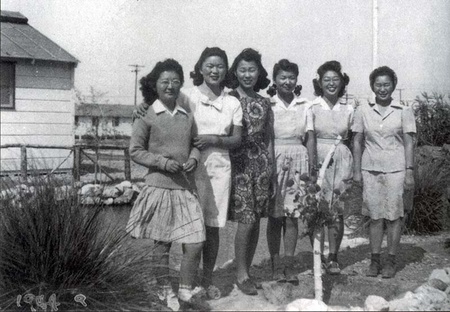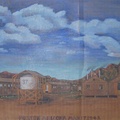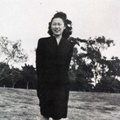When I search my past for the defining moment that turned my life around, I find it hard to pinpoint. Maybe there were many, some too subtle or mundane to recognize. I’m inclined to think each of us—starting from early childhood—moves in a certain arc and something, or a series of things, happen that push us rapidly and without resistance, along the curve. It may be an event as simple as missing a bus or an impulsive change of plans. Or as huge as the Great Depression or a mass incarceration.
Like many of us Nisei, I spent my early years on an isolated farm in a desert community of immigrant Japanese. In the hardy manner of survivors, this small community established a system of support: church, prefecture, and cultural organizations, newspapers, and The Japanese Association of the community. Ours was the Imperial Valley. These organizations provided succor in death, relief in disaster, and recreation with community picnics, church programs, and Japanese movies brought in from Los Angeles.
In that time, racism was blatantly supported by the U.S. government (Alien Land Law, Alien Exclusion Act, exclusion from citizenship), and experienced in schools and other public places. Children of color, Chinese, Mexican, Black, and Hindu, were segregated, and those that made it to the sixth grade were allowed to join mainstream schools. But we Japanese kids attended white schools from kindergarten on. My mother said that was because Japan stood up for us. Although there was little forthcoming in other areas, I got a strong message that we were descendants of a proud and protective race. My mother often said to me, “Whatever ‘they’ do to you, hold your head high. You are Japanese.” Our community seemed sufficient unto ourselves.
Because of my mother (my father was a quiet man), I didn’t have the identity problem so many Sansei have today. I didn’t expect anything from the white world, not did I consciously want anything. I didn’t envy pale skin or blue eyes, although curly hair would have been nice. I didn’t worry about going to the prom or belonging to clubs or sororities. In my senior year, I did wonder what the future held for me, but that didn’t last too long; Japan invaded Pearl Harbor and we West Coast Japanese were all herded into American concentration camps. But that was later.
I spoke only Japanese when I started kindergarten. When I learned to read, English became my language. I’m sure this had a lot to do with the twenty volumes of The Book of Knowledge my father bought from a traveling salesman. I loved the heavy books with their great glossy pages. The pictures made me eager to find out what it all meant: the fossils buried under our very feet, the master paintings, the poems, the classic condensed novels, illustrations of gallant knights on white stallions. My father also subscribed to women’s magazines (Women’s Home Companion, The Delineator), probably just to get rid of high-pressure salesman. Through these, I got a picture of what concerned the great American upper middle class.
And it was a wide world that revolved outside our insular Japanese community. Out there were movies and blonde heroes, and in those ladies magazines were stories of passion and adventure and delectable foods and how to make them, cures for halitosis and athlete’s foot, and ads for gas ranges and carpets. But it wasn’t my world, no more than were the Arabian Nights. It was exciting and romantic, but a fantasy. We lived in small frame structures that had to be moved in trucks every two or three years. Because of the Alien Land Law, we couldn’t own our farms and we moved when leases expired. Every son and daughter, every pair of hands worked to help out on the farm, in the kitchen, or at the washboard. Every pail of water had to be carried to the kitchen or the bathtub; we had no electricity or gas lines. Life was hard but we knew no other. Small pleasures hit our lives and moved us along.
In the Imperial Valley, the summers are unbearably hot but winters are often freezing. We saved our summer energy for autumn when there was a flurry of activity with planting and preparations for winter. The growing plants had to be protected from the frost. We tented cantaloupes individually with transparent paper over small wire arches. Tomatoes were protected by rows of brush covers. We buried stems of tall desert brush (for all the years I had worked with it, I hadn’t learned its name) leaning them over the seedlings. We lay three or four sheets of newspaper over the brush (continuing to the end of the row) and held down the paper with another layer of brush. This lean-to usually lasted the winter. By spring the paper disintegrated and all that was left was the battered desert brush, which we bundled again for the next year.
The paper we used were old newspapers from publishers’ warehouses. During my frequent breaks, I sat against the wall of our tool shed and read these two, three-year –old papers. From the Examiner, I learned about the dreaded communist threat. I also read their funnies (comic strips), which I preferred to the L.A. Times’. My parents subscribed to the Kashu Mainichi, a Japanese daily, which they carefully saved and bundled for the winter brush covers.
The Kashu had an English section, which I hadn’t read very often, but one year, sitting against the tool shed wall in the cold winter sun, I discovered a column called “Napoleon Sez” signed by one H. Yamamoto. I may have been twelve to thirteen years old. Yamamoto painted with language; I couldn’t see it all; the characters were real, the situations familiar. I liked the subtle humor and attitude. I could almost feel the philosophy—a kind of flippant commentary on the follies and foibles of members of our families and communities.
I recognized the people, the food we ate, the poverty we knew (Japanese farmers were still trying to pull out of the Great Depression), our ethic (gaman, on, giri, enryo*), and for the first time in my young life, it came to me that it was okay to talk about it, to put it all out there in the papers, for God’s sake, with humor and affection, and in ENGLISH, the language of Shakespeare and Tennyson, don’t you know? I guess I never really believed my mother’s lectures on ethnic pride until it was legitimized in English in Yamamoto’s warm and witty column.
Other Nisei columnists of the time were not always grammatical; they tried too hard to be funny and knowledgeable and they were too prideful; I did not feel intimacy in their language. They were mostly male writers. In fact, I thought H. Yamamoto was also male and I suppose that had a lot to do with my delight in finding a soul mate. That winter I rifled through bundles and bundles of old Kashu, looking for “Napoleon Sez.”
Then, a few years later, our family moved to Oceanside. Imperial Valley had had enough of us and spat us out like loose teeth, and we found ourselves on the West Coast. A colony of Japanese farmed on Santa Margarita Ranch (now Camp Pendleton) in sight of the glittering Pacific. By luck, mother was asked to cook for Japanese migrant workers in a boarding house in town, and being intelligent, independent, and a take-charge person, she soon took over the management.
The rural Japanese of then were nomads, circling around and around as leases expired and meeting each other either coming or going. It was inevitable that I should finally meet H. Yamamoto. The “H” stood for Hisaye. She lived with her father and brothers (the siblings she wrote about) and the other colonists on Santa Margarita Ranch. They raised patches of flowers, strawberries, string beans, and corn.
I was overjoyed to meet Hisaye, but she didn’t seem to like me. I was still in high school and she was a few years older, had gone to junior college, and was more knowledgeable in the ways of the world. I followed her column when I could, but we were not what you called friends.
During the war and our incarceration, Hisaye and I were thrown together at the Poston Chronicle office where Hisaye was a reporter and I was an inept “Cartoonist.” Because no self-respecting artist would do this lowly work (cutting stencils, mastheads, and by-lines), four of us teenagers were hired by default. There wasn’t enough work to keep us all busy, so I hung out with Hisaye. I went with her on her rounds of the police, art, and drama departments. We finally became friends.
And she has remained my friend through those years in camp and many, many more. Through her example, I have hung on to an incredible dream of one day becoming a writer. Through her example, I have tried to examine my heart and write with honesty and integrity.
The circumstances that brought this together started with my father’s twenty volumes of The Book of Knowledge; the hard work with the brush covers, the accident of finding a mirror of myself in an old newspaper column, the growing wish to make connection with that part of me. Then the war brought to focus what it really meant to be Japanese in an America at war with Japan. The mass incarceration changed all Nisei lives. It brought some of us closer to our commonality, and pushed some of us away.
Today Hisaye Yamamoto is an internationally known writer; her short stories have appeared in literary and scholarly magazines and many of them are considered among the best in the country. She is revered as one of the most accomplished Asian American writers—no small feat, considering what minorities have to surmount to be included in the mainstream.
Through the writing of H. Yamamoto, I began to understand the value of self and community. Beneath the bravado of our Nisei smile I have found drama, warmth, poignancy, and love. Gaman, on, giri, and enryo are implicit in our stories, rooted in our genes, lighting and lifting our lives.
Notes:
*gaman—to endure, hold up in the face of an ordeal
*on—a debt that can never be repaid
*giri—an obligation owed
*enryo—to hold back, to keep oneself in check
*This article was originally published in Nanka Nikkei Voices: Turning Points, in January 2002. It may not be reprinted or copied or quoted without permission from the Japanese American Historical Society of Southern California.
© 2002 Japanese American Historical Society of Southern California






